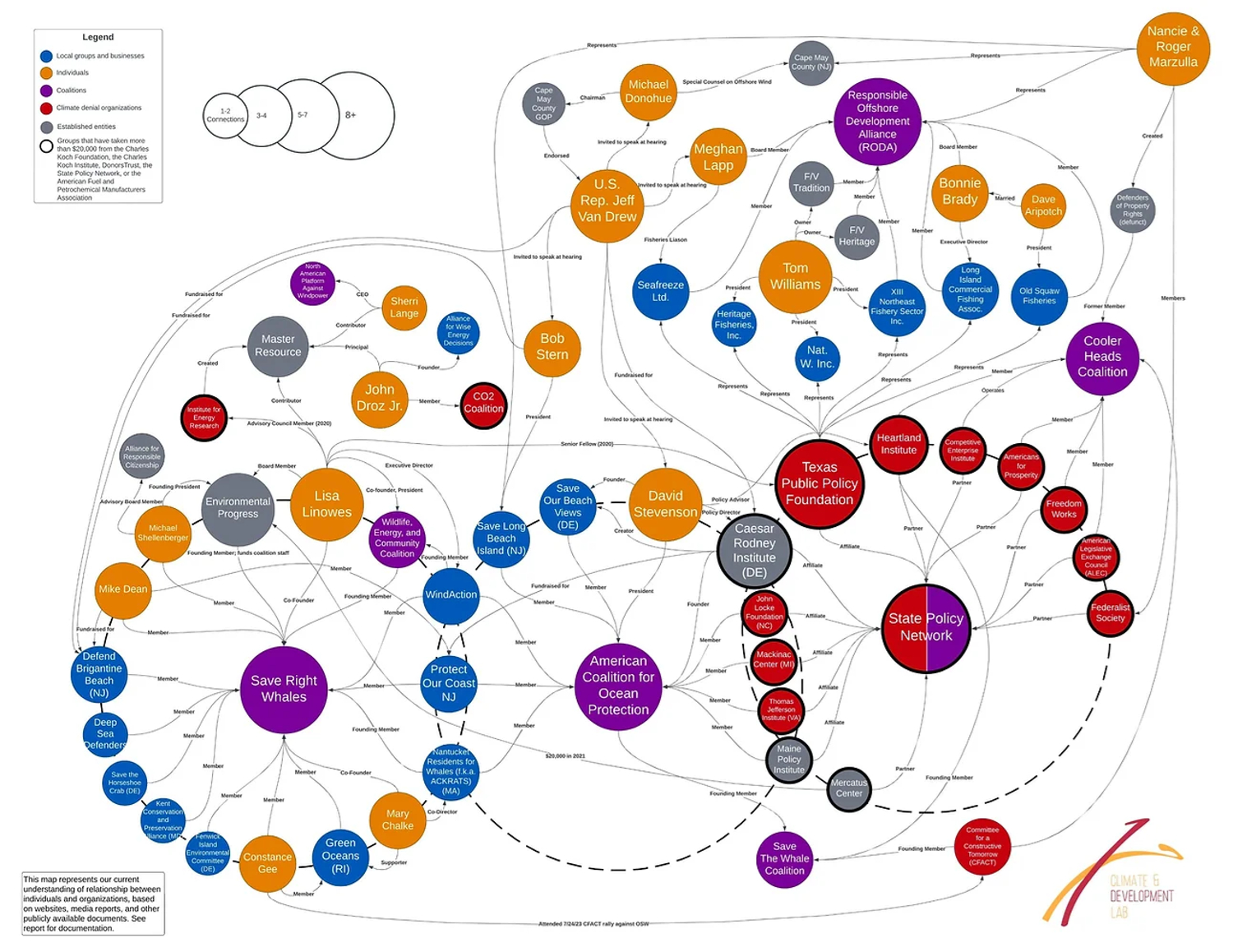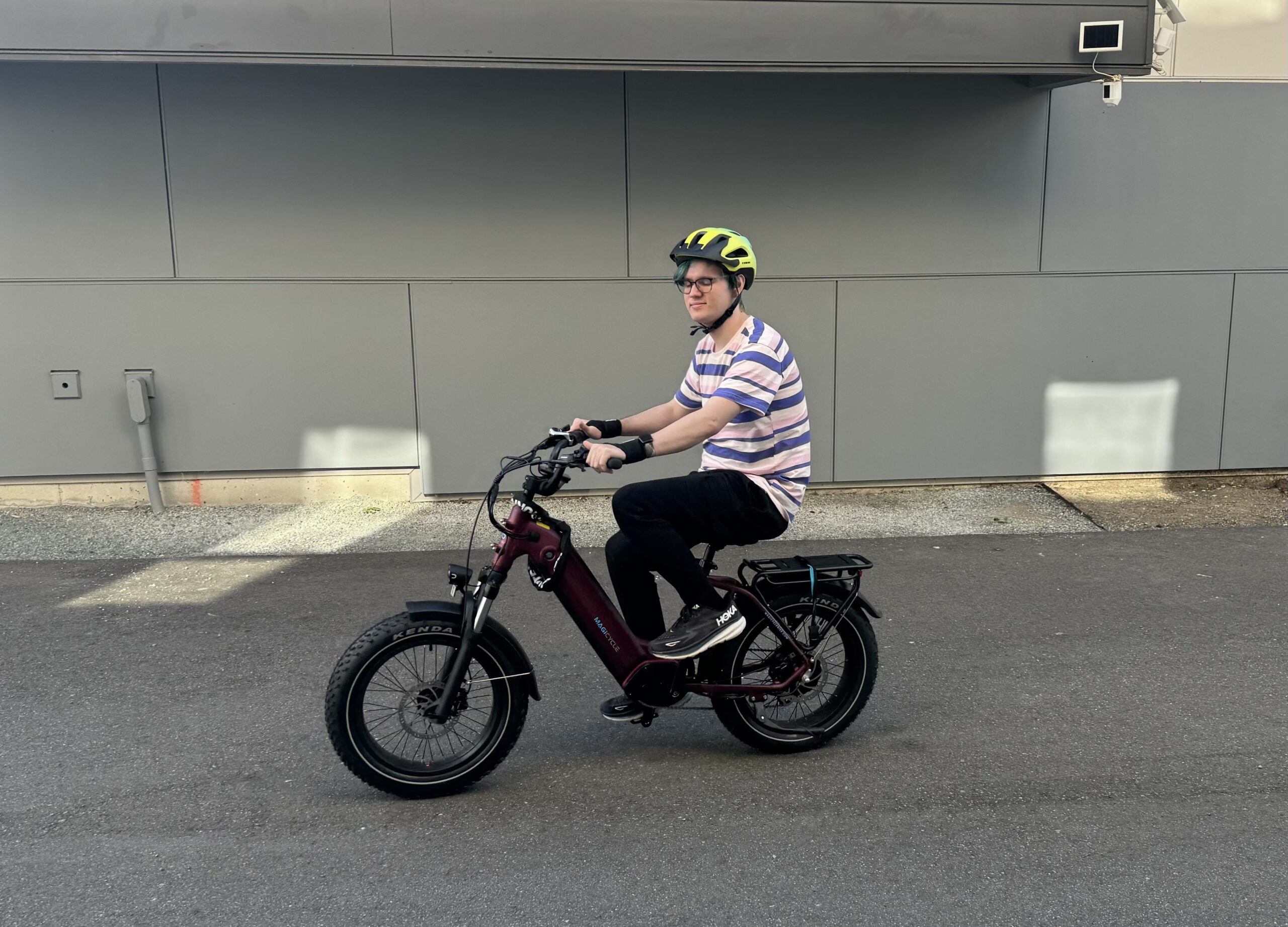Sign up for daily news updates from CleanTechnica on email. Or follow us on Google News!
A month ago, we reported on how opponents to solar farms who appear to be local are actually supported by national organizations with one mission — protecting fossil fuels. You might ask yourself why anyone would want to protect fossil fuel companies when their activities have altered the Earth’s climate. They threaten to interrupt the flow of the Gulf Stream, melt the polar ice caps, and bring drought and flooding to many parts of the world. A new study from Brown University shows in graphic detail how similar linkages exist between opponents of offshore wind and captive fossil fuel apologists at the national level.
The Climate and Development Lab (CDL) at Brown University is a student-faculty think tank informing a more just, equitable, and effective climate change policy. Recently, it released a report entitled “Against the Wind: A Map of the Anti-Offshore Wind Network in the Eastern United States.” That report provides an unparalleled window into how fossil fuel interests are working with climate denial think tanks and community groups to obstruct offshore wind projects. Below is the graphic the group created to illustrate the linkages between so-called “grass roots” local opposition groups and the fossil fuel industry.

These community groups have made national headlines for their opposition to projects in Rhode Island, Massachusetts, and New Jersey, the CDL says. They appear to be new organizations that operate organically and independently, but they often share legal support, personnel, talking points, and financial resources with major organizations that have been blocking climate policy for the last several decades. Knowingly or not, they are executing a strategy laid out for them by climate obstructionists in 2012.
In its report, the Brown University CDL shows how think tanks in the anti-offshore wind movement have received donations from six fossil fuel-interested donors between 2017 and 2021. Of these donations, $16,278,401 has gone to members of a grassroots-appearing coalition at the center of the movement. We would hasten to add that $16,278,401 is a significant amount of money.
As public relations and obstruction specialists actively engage local groups to block offshore wind projects, the climate and environmental justice consequences are dire, the Brown University CDL adds. Offshore wind projects may struggle to get off the ground, locking us into catastrophic climate consequences experienced disproportionately by Black, Indigenous, Latino, and low income communities.
“I think for years, there has been this sense that this is not all coincidence. That local groups are popping up in different places, saying the same things, using the same online campaign materials,” says Michael Burger, executive director of the Sabin Center for Climate Change Law at Columbia University.
Brown University CDL — Three Case Studies
The Climate and Development Lab at Brown University has created three studies to support their findings. The first is entitled Discourses of Climate Delay in the Campaign Against Offshore Wind: A Case Study from Rhode Island. It examines how Green Oceans, an anti-offshore wind group based in Little Compton, Rhode Island, may borrow arguments from national climate disinformation organizations and use them in local anti-offshore wind campaigns. Fossil fuel-funded think tanks, such as the Texas Public Policy Foundation (TPPF) and the Caesar Rodney Institute (CRI), are some of the major groups creating anti-wind rhetoric, which often disguises itself as pro-environmental. Many of the arguments that Green Oceans advances echo TPPF and CRI’s anti-wind campaigns and similarly rely on the strategies of climate delay and misinformation.
The second is entitled Against The Wind — A Map of the Anti-Offshore Wind Network in the Eastern United States. It says a collection of community-based groups have resisted new offshore wind projects from Massachusetts to Virginia. They attack offshore wind projects at protests, town council meetings, and in the pages of local newspapers, often employing misinformation. This report reveals how these East Coast offshore wind opponents are not solely local — they are embedded in a network of seasoned fossil fuel interests and climate denial think tanks that have perfected obstruction tactics for decades.
These new grassroots-appearing groups and experienced obstructionist think tanks share legal support, public speakers, leadership, and information and tactical subsidies. Though they appear to operate organically, in many cases they are directly supported by well funded national organizations with ties to the fossil fuel industry and dark money. This creates a facade of local opposition that is actually part of a broader, sustained anti-renewable energy campaign.
The network revolves around three key coalitions. The American Coalition for Ocean Protection (ACOP) — founded by a libertarian think tank — is at the center, connecting climate denial think tanks sponsored by the fossil fuel industry with several local anti-offshore wind (anti-OSW) organizations.
Three of the local groups in ACOP are also members of Save Right Whales, which is the primary coalition for the new wave of anti-OSW groups. Save Right Whales was created by Environmental Progress, which has ties to organizations that routinely obstruct climate policy. ACOP also co-founded the Save The Whale Coalition. The only two other members of Save The Whale are climate denial think tanks that share nearly identical anti-OSW talking points. The five obstructionist think tanks in ACOP are also members of the State Policy Network, a key national player in right wing politics and the climate change counter-movement.
Though donor-advised funds and disclosure issues make it impossible to reveal all direct funding sources, the Brown University CDL identifies a direction of influence extending from dark money donors and fossil fuel organizations to local grassroots-appearing groups. It identified six major fossil fuel and dark money donors — the Charles Koch Foundation, the Charles Koch Institute, Donors Trust, the State Policy Network, and the American Fuel and Petrochemical Manufacturers Association. Together they fund 17 think tanks involved in the anti-OSW network. 14 of these have been identified as publishers of climate change denial.
The think tanks, in turn, influence local anti-OSW groups by providing financial resources, legal support, and personnel. The CDL identifies a total of $72,276,593 in contributions from the six major donors to groups in the network between 2017 and 2021. Of these donations, $16,278,401 have gone to members of ACOP.
Brown University Catalogs Congressional Disinformation
The third report, Spinning Negativity, examines the influence of these same national groups on the 118th Congress. It examines 441 claims made during the first six months of the 118th Congress. Though the recent spike in opposition to offshore wind largely appeared in state and local arenas in 2023, Spinning Negativity shows that many of these same arguments have reached the halls of Congress. Many of the claims are misleading or false, sensationalizing negative elements of the technology, while ignoring the massive local and global impacts of continued mass combustion of fossil fuels.
“What surprised me was how much of the belief in disinformation seemed to be genuinely held by members of Congress,” said the report’s lead author, Brown University researcher Isabella Garo. [CleanTechnica readers are unlikely to be as surprised as Garo is.] “That is, it seems the false claims about offshore wind have become so pervasive that even our leaders believe them. This seems even more dangerous than if they were just consciously lying, because it seems they will more likely stick with these false claims, and no amount of data or evidence will change their views.”
 Chip in a few dollars a month to help support independent cleantech coverage that helps to accelerate the cleantech revolution!
Chip in a few dollars a month to help support independent cleantech coverage that helps to accelerate the cleantech revolution!
The Takeaway
Last year, we reported how officials in Cape May County, New Jersey, celebrated after Ørsted announced it was pulling the plug (metaphorically speaking) on two proposed projects — Ocean Wind 1 and Ocean Wind 2 — in the Atlantic Ocean about 15 miles east of the famous Jersey shore. Those officials and many residents of the county believe the wind farm would cause “catastrophic environmental damage” and could harm the shore’s tourism-based economy. None of those opponents have the intellectual heft to ask themselves what will happen once their shoreline communities sink below the waves as ocean levels rise due to global heating.
We often refer to the NIMBY — not in my backyard — concerns when it comes to renewable energy. Somehow, the Luddites welcome the sight of fracking trucks next door to schools, but faint dead away at the prospect of wind turbines 15 miles out to sea. It seems clear that fossil fuel companies are perfectly willing to continue to pollute the Earth in the pursuit of profits. You might think that borders on criminal stupidity, but money has an amazing power to cloud people’s judgement. For the sake of a few million dollars funneled to groups that are willing to say anything for a buck, these companies have reaped hundreds of billions in profits. Their return on investment is 1000% or more. Who wouldn’t make that deal?
We here at CleanTechnica natter on endlessly about stooges in the pay of Charles Koch and other fossil fuel interests who are willing to sell their souls for thirty pieces of silver. We often suggest that there are larger forces at work than all these hokey local groups like Save Our Barbed Wire and Citizens For Pig Waste Lagoons (or Citizens United for that matter).
Now the Brown University Climate and Development Lab has shone a light on some of the linkages between those local groups and their nefarious benefactors. Their research seems to validate our suspicions — the fossil fuel industry is a great big club and we aren’t in it. We get to breathe in the polluted air they leave behind and watch our coastlines disappear from more powerful storms. They get to pay their top executives millions of dollars while we face financial ruin. That seems fair enough, doesn’t it?
Knowing what we do now, thanks in part to Brown University and its CDL, we are in a position to counter some of the disinformation we are swimming in. It’s a start, but we are rapidly losing the race to maintain the Earth as a place that supports human life. We have the power to end the fossil fuel madness by voting for candidates who are committed to protecting the Earth and by bringing enlightenment to those who believe in the psycho-babble these climate deniers are peddling. In the words of Elie Wiesel, “There will be times when we are powerless to prevent injustice, but we must never fail to protest.”
Have a tip for CleanTechnica? Want to advertise? Want to suggest a guest for our CleanTech Talk podcast? Contact us here.
Latest CleanTechnica TV Video
CleanTechnica uses affiliate links. See our policy here.




